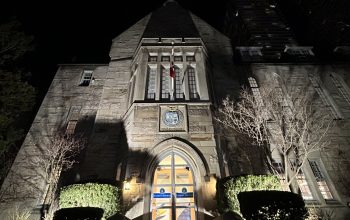Maka and Guo elected to represent full-time U of T undergraduates in Arts and Science
Aaron Panciera NEWS EDITOR
Photo: University of Toronto.
This month, the University of Toronto (U of T) held elections for the eight vacant, student-held positions on the governing council. The elections were held for representatives for full-time undergraduate students in the faculty of Arts and Science, University of Toronto Scarborough (UTSC), and University of Toronto Mississauga (UTM), full-time undergraduate students in Professional Faculties, part-time undergraduate students, graduate students in the Humanities and Social Sciences, as well as graduate students in the Physical and Life Sciences.
For the election, candidates were split, and voted on, based on their constituencies. For example, an individual running to represent full-time undergraduates in Arts and Science, UTSC, and UTM would not compete with a candidate running to represent Professional Faculties.
Price Amobi Maka and Edie Guo were both elected to represent full-time undergraduates in Arts and Science, and at UTSC and UTM. This was the most sought after position, and the one of highest relevance to most U of T undergraduate students, as 23 candidates competed for two seats.
Maka, a fourth-year UTM student, has previous experience as an events coordinator for “several academic societies,” as well as participating as a Frosh Orientation Leader. Maka’s platforms and priorities are highlighted by expanding the university community, funding for a common goal, and providing affordable education. More specifically, he aims to expand the on-campus work study program, introduce a co-op program, and allocate more funding toward new student initiatives and societies.
“My sole duty on the Governing Council is to act as an agent for advocacy by being a strong voice for student activism to make all University of Toronto campuses a more safe, inclusive, and engaging place for students to prosper academically and change the world around them with their achievements,” Maka’s website read.
Guo, a student at Trinity College, campaigned for an exam repository with answers for all classes, an extended credit/no-credit deadline, a mental health emergency room, more paid co-op, internship, and research universities, and expanded green technology on campus. Guo also co-chairs the Hart House Farm Committee and is a member of the Hart House Board of Stewards.
The Trinity College Environmental Society (TCES) publicly advocated for Guo, who promises to support green initiatives.
“The TCES is happy to endorse Edie Guo for her commitment to environmental initiatives on campus,” the TCES posted on its Facebook page.
Along with Maka and Guo, Litos Li from Applied Science and Engineering and Tom Sutherland from the Faculty of Law were elected for the Professional Faculties constituency; Mala Kashyap from Woodsworth College and Susan Froom from Trinity College were elected for the part-time undergraduate student constituency; Harry Orbach-Miller from the School of Public Policy and Governance was elected to the graduate Humanities and Social Sciences constituency; and Sandhya Mylabathula from Kinesiology and Physical Education was voted to represent the graduate Physical and Life Sciences constituency.
The Governing Council is the highest policy-making body at U of T. It is the senior governing body that oversees academic, business, and student affairs at U of T. Their decisions include the approval of academic programs, budgets, employment policies, funding, student life, and tuition fees, among others.




